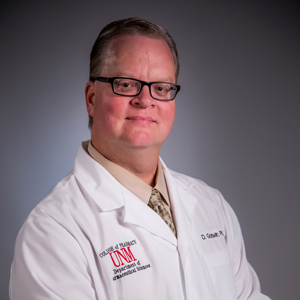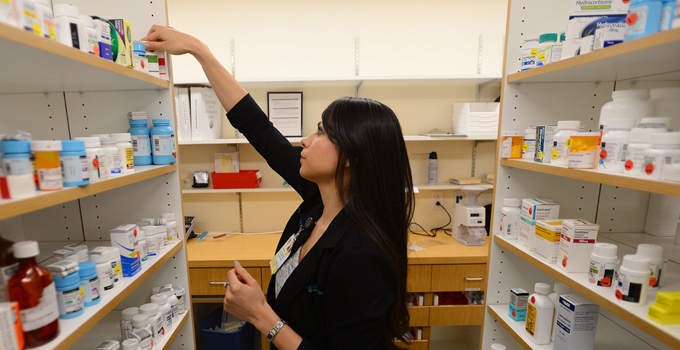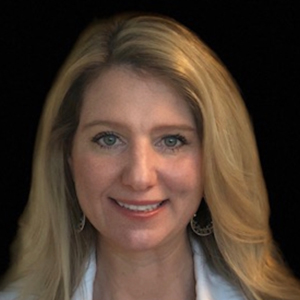Inside a conference room at The University of New Mexico sits the person leading the charge to recruit, teach and inspire the state’s next generation of pharmacists.
Donald Godwin, PhD, is the dean of the UNM College of Pharmacy and a professor of pharmaceutical sciences. Dusty pill bottles reminiscent of an old apothecary shop are the backdrop for this interview. It’s a collection donated to the college—pieces of history—but Dean Godwin is focused on the future.
“I'm not a pharmacist. I'm one of only three pharmacy deans in the country who is not a pharmacist; I have a PhD in pharmaceutical sciences. I'm a scientist and educator,” Godwin says smiling.
“The students and education have always been my passion. I want to make sure we're recruiting, training, and retaining the best and the brightest in the state. And I want to make sure when they get out to practice pharmacy that they can make a difference.”
But Godwin admits right now it’s tough for pharmacists. A nationwide shortage of pharmacists has put extra pressure and strain on retail pharmacists across the country.
Pharmacist Shortage
In anticipation of a pharmacist shortage, in the early 2000s, Godwin says the number of pharmacy schools in the U.S. went from 80 up to 140. More schools meant more pharmacists, but then the recession of 2008 hit and pharmacists who were planning on retiring, couldn’t. So, that wave of new pharmacy graduates had fewer jobs to fill.
At the same time, Godwin says, retail pharmacy started to contract, stores were closing, there were mergers and then came the COVID pandemic. Pharmacists who had to fill hundreds of prescriptions a day also had to administer COVID tests and shots. Godwin says pharmacy quickly became an unattractive career field. Now there’s a shortage, and he predicts it’s only going to get worse.
“This is decreasing access for patients. We need more pharmacists,” he said. That need for pharmacists is already increasing the opportunities for pharmacists across New Mexico with increasing salaries and sign on bonuses for some positions.

When I get my own prescription refills, it's not a physician that authorized the refill, it's a pharmacist, and eight times out of 10 it's a graduate of mine. I recognize the name I taught. That is the ultimate, the fact that a student that I taught is doing what they want to do, and they're helping me manage my medication therapy.
Future of Pharmacy
“When I get my own prescription refills, it's not a physician that authorized the refill, it's a pharmacist, and eight times out of 10 it's a graduate of mine,” says Godwin. “I recognize the name I taught. That is the ultimate; the fact that a student who I taught is doing what they want to do, and they're helping me manage my medication therapy.”
In addition to filling critical pharmacy positions in retail, some of Godwin’s former students are now pharmacy leaders themselves, inspiring others to join a wide range of careers in pharmacy.
One of those former students is Suzette Sturtevant, PharmD, who is now the pediatric pharmacy supervisor at UNM Hospital. Her title is one of only two in the entire state.
“I'm really passionate about introducing people to the world of pediatrics because it is a specialty,” Sturtevant said. “A lot of times students coming into pharmacy school don’t know about it.”
But she always knew. Sturtevant says she knew from the beginning that she wanted to work with kids. She laughs as she remembers a time at UNM when one of her professors was reminding her pharmacy class about wearing professional attire during their first rotations at the hospital.
“In a class of 83 students, I raised my hands and said, ‘well, actually, I'm getting a pink stethoscope and it’s going to have this cute little fuzzy thing on the end of it, with a light because I'm doing pediatrics,’” Sturtevant said.
That’s exactly what she did, and now she leads a team of pediatric pharmacists that she helped to build at UNM Hospital. “I have six different areas, and I'm proud to say that now every single one of those areas has a pharmacist that rounds with the team,” she said.
That means every morning pediatric patients and their families at UNM Hospital have the opportunity not only to speak with their doctor or nurse, but also directly to a pharmacist about medications.
“Our pharmacists see these patients, they see these families, they get to know their stories and they become a part of their journey. It is very exciting,” Sturtevant says, “They form a bond not only with the patients but with the providers as well. And so, you really do become a holistic team.”
Ellen Fernandez, PharmD, is on Sturtevant’s team. She is the pediatric critical care clinical pharmacist lead working in the pediatric ICU. Her job is to prescribe medications for some of New Mexico’s tiniest patients, who are sometimes facing life threatening illnesses or injuries.
“Being a part of the team to provide the care for these patients is really incredible,” Fernandez said. “We provide education about the child’s medication to our families prior to discharge and throughout their hospital stay. Pediatrics is very family focused medicine and it’s the families who know their children the best, so having their input is always very helpful.”
As a leader, Sturtevant says she hopes her role in pharmacy impacts not only her patients, but her team as well.
“I consider this a blessing to work for the state of New Mexico and take care of the sickest, most vulnerable pediatric patients; that is truly my mission,” she said. “That is amazing, but then to be able to affect people's trajectory that they want to come work here, that is how I know we're doing good things.”
Back inside that UNM conference room at the College of Pharmacy, Dean Godwin sees his mission very similarly, “Pharmacists are by far the most accessible health care providers. You can walk into any pharmacy and talk to the pharmacist. So, the students are always my passion, but if we can bring in more pharmacists, it’s better for the people in New Mexico.”
Becoming a Pharmacist
The degree needed to practice pharmacy is the Doctor of Pharmacy (PharmD). Unlike a Medical Doctor (MD), students do not need to have an undergraduate degree to apply for admissions for a pharmacy school. At UNM, students need to complete 79 credit hours of pre-requisite courses at community colleges and/or 4-year universities. Click here for more information on applying to the program.
- Pharmacists play a crucial role in healthcare by providing medications and counseling to patients. They have the opportunity to directly impact people's lives by ensuring safe and effective use of medications, answering questions, and offering advice on health and wellness.
- The field of pharmacy offers strong job prospects and stability. There is a consistent demand for pharmacists in various health care settings, including retail pharmacies, hospitals, clinics, and research institutions. This stability can provide a sense of security and job satisfaction.
- Pharmacists can work in different practice settings such as community pharmacy, hospital pharmacy, pharmaceutical industry, academia, research, regulatory agencies, and more. This versatility allows individuals to choose a career path that aligns with their interests and goals.
- Pharmacists typically receive competitive salaries and benefits and starting salaries of $125,000 a year are not unusual.
The PharmD program is 4 years of classroom study and training in pharmacies, hospitals, and clinics with pharmacists across the state. Pharmacists need to possess a solid understanding of medications, drug interactions, dosage forms, and patient care. The field of pharmacy is constantly evolving with new emerging drugs and treatment options. Pharmacy also offers numerous opportunities for professional growth and advancement. Pharmacists can pursue specialized areas such as clinical pharmacy, pharmaceutical research, pharmacotherapy, or administration. Additionally, some pharmacists may choose to open their own independent pharmacies or work as consultants.

